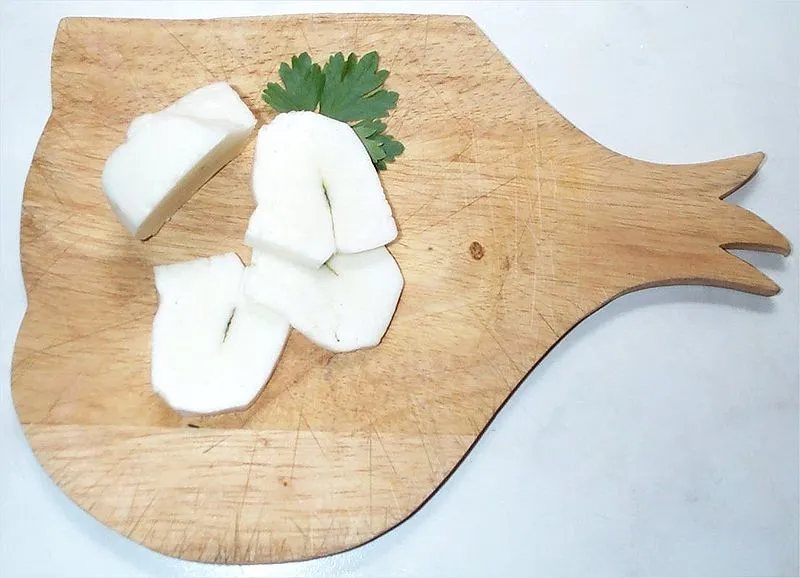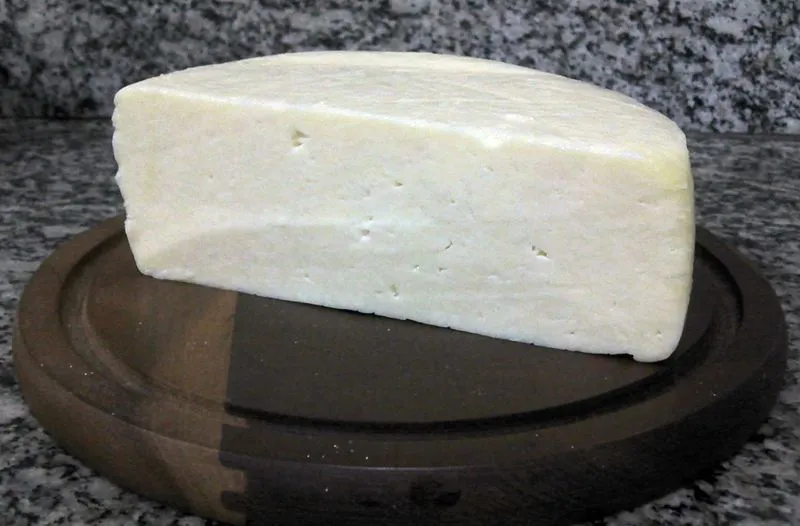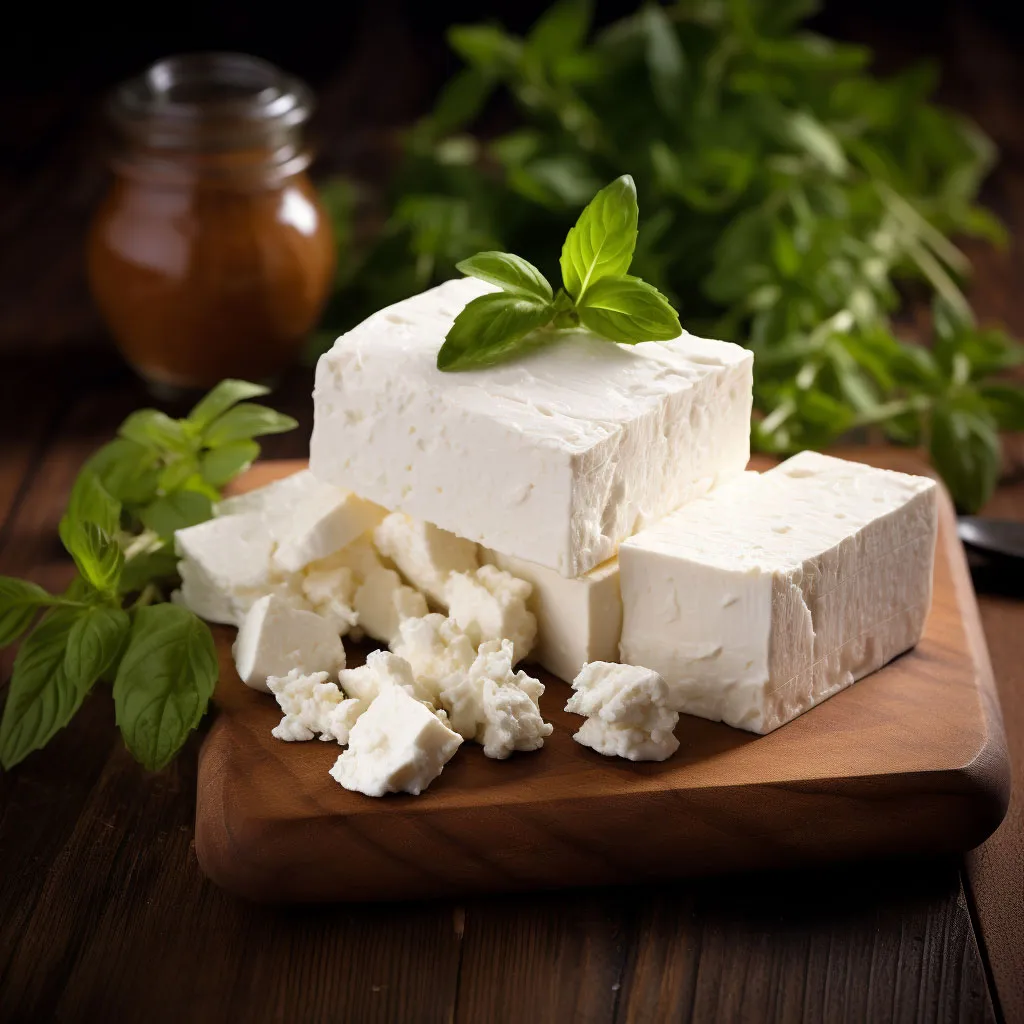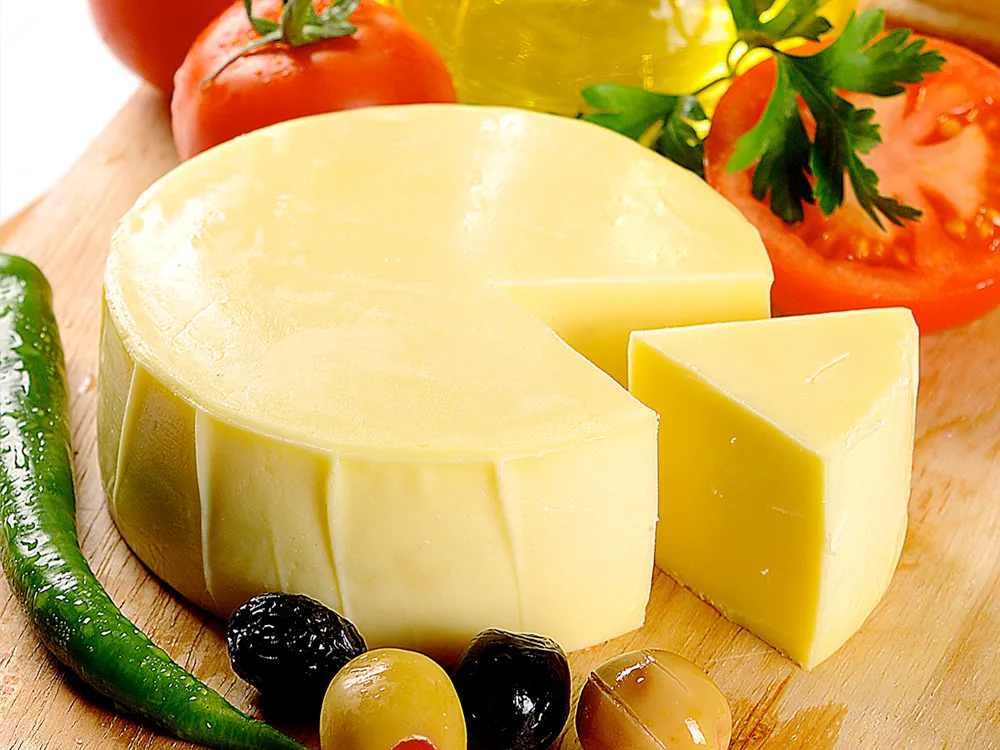Halloumi
What is Halloumi Cheese? What Does Halloumi Taste Like?
Halloumi cheese is a unique and delicious cheese that has gained popularity in recent years, becoming a favorite among cheese enthusiasts and food lovers alike. If you have yet to try it, you may be wondering what halloumi cheese tastes like and what makes it so unique. It is a firm, brined, slightly springy white cheese, traditionally made from a mixture of goat's and sheep's milk, although these days, cow's milk is also added to the mixture. No acid or acid-producing bacteria play a role in the production of this cheese. In 2021, Halloumi secured a Protected Designation of Origin (PDO) status.
What Does Halloumi Cheese Taste Like?
Halloumi has a distinct and robust flavor that sets it apart from other types of cheese. It is rich, salty, and slightly tangy, with a satisfyingly chewy texture. When grilled or fried, halloumi develops a delicious crispy crust while remaining soft and somewhat creamy on the inside. This unique taste is sure to intrigue your palate and leave you eager to try it.
The texture of this Cypriot cheese is similar to that of mozzarella or thick feta, except that it has a strong, salty flavor imbibed from the brine preserve. Cooking the Halloumi removes all its saltiness and empowers it with a creamy texture. Since the cheese has a high melting point, it can be quickly fried or grilled.
When compared to other cheeses, halloumi is often likened to a combination of feta and mozzarella. It has the salty and briny notes of feta cheese but with a smoother and less crumbly texture reminiscent of fresh mozzarella. The unique taste and texture profile of halloumi makes it a versatile ingredient that can be used in a variety of dishes.
What Kind Of Cheese Is Halloumi?
Halloumi cheese is classified as a semi-hard, unripened cheese. It originated in Cyprus and is now famous throughout the Mediterranean region and beyond. Made from a mixture of goat's and sheep's milk, halloumi has a high melting point, making it ideal for grilling or frying without losing its shape.
This cheese is traditionally handcrafted by local artisans who follow a centuries-old recipe. The process involves curdling the milk with rennet and then heating the resulting curds until they become elastic and flexible. The curds are then molded into flat blocks and brined to give halloumi its characteristic flavor and texture. This traditional craftsmanship is a testament to the rich cultural heritage of halloumi, making you feel connected to its roots.
What Is Halloumi Cheese Used For?
Halloumi cheese is incredibly versatile and can be used in a variety of dishes. Its unique characteristics make it a popular choice for grilling, as it retains its shape and develops a beautiful caramelized crust. Grilled halloumi can be enjoyed on its own as a delicious appetizer or used as a protein-rich addition to salads, sandwiches, or wraps. The versatility of halloumi in cooking will inspire you to get creative in the kitchen.
In addition to grilling, halloumi can also be pan-fried, baked, or even eaten raw. Its firm texture makes it ideal for slicing and cubing, allowing it to be used in kebabs, stir-fries, pasta dishes, or as a topping for pizzas. The salty and tangy flavor of halloumi pairs well with sweet and savory ingredients, making it a versatile option in both savory and sweet applications.
Options abound: a halloumi and watermelon salad works well on a hot summer’s day, or you might try a halloumi and vegetable kebab, a halloumi and fig pizza, or add it to some couscous with a dressing of your choice.
Halloumi is also an essential part of a Cyprus Meze, and many times it is offered as an accompaniment with a cold beer. The cheese also tastes lovely when grilled, pan-fried, or thinly sliced on a salad.
What Is Halloumi Cheese Made From?
Halloumi cheese is made from a combination of goat's and sheep's milk. The milk is first heated to a specific temperature, and then rennet, a natural coagulant, is added to curdle the milk. The resulting curds are cut and stirred until the whey is expelled, leaving a solid mass of curds.
Next, the curds are warmed and kneaded to create a stretchy and pliable texture. The cheese is then shaped into blocks or discs and brined in a solution of salt and water. This brining process gives halloumi its characteristic salty flavor and helps preserve the cheese.
How Long Does Halloumi Last?
The shelf life of halloumi cheese varies depending on how it is stored. When purchased fresh, halloumi cheese can last up to two weeks if kept in the refrigerator, tightly wrapped in plastic, or stored in a brine solution. However, once opened, it is best consumed within a few days for optimal freshness and taste.
If you can't finish the halloumi within the recommended timeframe, you can extend its lifespan by freezing it. When frozen, halloumi can last up to six months, allowing you to enjoy this delicious cheese at your convenience. To freeze halloumi, wrap it tightly in plastic wrap or place it in an airtight container before putting it in the freezer.
Where Is Halloumi From?
Halloumi cheese has its roots in Cyprus, an island nation located in the eastern Mediterranean. This cheese has been a staple in Cypriot cuisine for centuries, and it remains an integral part of the island's culinary heritage.
Today, halloumi is not only enjoyed in Cyprus but has also gained popularity in many other countries around the world. It has become a sought-after cheese in various cuisines, with chefs and home cooks alike incorporating it into their dishes to add a unique and delightful flavor.
Why Is Halloumi So Expensive?
One reason why halloumi cheese can be relatively expensive is the sourcing of its primary ingredients—goat's and sheep's milk. Compared to cow's milk, goat's and sheep's milk are typically more costly due to the lower milk yield and the challenges associated with raising these animals.
In addition to the higher cost of the ingredients, the production process of halloumi cheese requires careful craftsmanship and attention to detail. Handmade halloumi, which is often preferred for its traditional and authentic flavors, involves meticulous steps that contribute to the overall price of the cheese.
Why Is Halloumi Squeaky?
If you've ever had halloumi cheese, you may have noticed its unique, squeaky texture when you take a bite. The squeaky sensation is a result of the cheese's high melting point and its unique blend of proteins.
When grilled or fried, the proteins in halloumi become tightly packed, leading to its firm and squeaky texture. This distinct characteristic is highly sought after by many halloumi enthusiasts and adds to the overall eating experience of this delicious cheese.
In Conclusion
Halloumi cheese is a flavorful and versatile cheese that offers a unique taste experience. Its rich, salty, and tangy flavor, combined with its firm texture, makes it a favorite among food lovers. Whether grilled, fried, or eaten raw, halloumi can elevate a wide range of dishes, adding a deliciously distinct flavor and satisfying chewiness.
Originating from Cyprus, halloumi has become popular worldwide, appreciated for its traditional craftsmanship and exceptional taste. While halloumi cheese may be a bit more expensive due to its production process and the sourcing of its ingredients, the experience it delivers is well worth the investment.
So, if you're looking to explore new flavors and expand your cheese repertoire, give halloumi a try. Whether you're an experienced cheese connoisseur or a curious food lover, one bite of halloumi is sure to leave a lasting impression.

Over 200,000 page views per month, Put your store on our map!
Contact UsOther cheeses from Cyprus:
Halloumi cheese is a famous Mediterranean cheese known for its unique texture and delicious taste. However, if you're unable to find halloumi or simply want to try something new, several alternatives can be used as substitutes. In this article, we will explore different cheeses that can be used as halloumi …
Read MoreHalloumi Q & A
-
Is Halloumi Cheese Lactose-Free?
While halloumi cheese has lower lactose content compared to some other dairy products, it is not entirely lactose-free.
People …
Read More -
Is Halloumi Cheese Vegetarian?
Yes, halloumi cheese is generally considered vegetarian-friendly, although there are exceptions to this rule.
It is made from …
Read More -
Is Halloumi Cheese Gluten-Free?
Yes, halloumi cheese is gluten-free.
It is made from a combination of sheep's, goat's, and sometimes cow's milk and …
Read More -
Does Halloumi Cheese Melt?
Halloumi cheese is known for its unique melting properties. When heated, halloumi becomes soft and develops a pleasant golden …
Read More -
How To Store Halloumi Cheese
Proper storage is essential to maintain the freshness and quality of halloumi cheese. After opening the package, it is …
Read More -
How Long Can Halloumi Cheese Sit Out?
While halloumi cheese can withstand higher temperatures than some other cheeses, it is still important to handle it properly …
Read More -
Can You Freeze Halloumi Cheese?
Yes, you can freeze halloumi cheese.
Freezing halloumi can help prolong its shelf life and prevent it from …
Read More -
Can Dogs Eat Halloumi Cheese?
Dogs, unlike cats, can tolerate small amounts of dairy products. However, it is essential to note that some dogs …
Read More -
Can Cats Halloumi Cheese?
When it comes to cats and their diet, it is essential to be cautious about the foods you offer …
Read More -
Can You Eat Halloumi Cheese While Pregnant?
One common concern for pregnant women is whether it is safe to consume certain foods. Rest assured; halloumi cheese …
Read More






